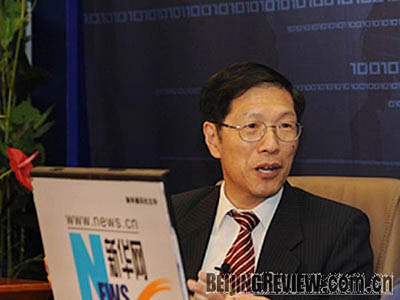|
 |
|
Tao Wenzhao, Deputy Director of the Institute of American Studies under the Chinese Academy of Social Sciences, shared his views on U.S. Secretary of State Hillary Clinton's scheduled visit to China in an interview with Xinhuanet on February 13 in Beijing (CHEN JIE) |
From February 15 to 22, Hillary Clinton is scheduled to visit four Asian countries, including Japan, Indonesia, South Korea and China, on her first foreign trip as U.S. Secretary of State. Tao Wenzhao, Deputy Director of the Institute of American Studies under the Chinese Academy of Social Sciences, shared his views on Clinton's visit to China in a recent interview with Xinhuanet.
Xinhuanet: What are the implications of Clinton's visit?
Tao Wenzhao: Concerning the choice of destinations, Japan is a major ally of the U.S. in the Asia-Pacific region; the Republic of Korea is its long-term ally; Indonesia is the world's most populous Muslim country, where the newly elected president Barack Obama spent his childhood; and U.S.-China ties are considered among the most important in the international sphere in the 21st century.
The scheduled time for Clinton's visit to China, her last stop, is February 20-22. The Obama administration gave deep consideration to her itinerary. First, it will help create a better atmosphere for communication between the two countries if Clinton could review her previous stops and brief the Chinese Government on them. Second, it will be the first vis-à-vis communication between high-level officials from both sides since Obama took office, symbolizing that bilateral relations are on the right track. Finally, it will lay a foundation for the meeting between Obama and Chinese President Hu Jintao at the G20 Summit in London this April.
What will be the major issues on Clinton's agenda to discuss with the Chinese Government?
I think the global financial crisis will be one of the topics. China is the largest foreign holder of U.S. Treasury securities; closer cooperation between the two countries is vital if they are to resist the crisis.
Climate change is a new area of cooperation. Both sides discussed cooperation on energy and environmental protection at the fourth and fifth China-U.S. Strategic Economic Dialogues, and they signed a 10-year cooperation agreement on energy and environmental protection in June 2008. The Obama administration is calling for even more intense U.S.-China cooperation in the fight against climate change.
The human rights issue will be unavoidable as it is part of U.S. foreign affairs. There has been a sea change between the situation in the early 1990s and the situation now. It was common practice back then for Americans to criticize China over human rights, which was also used as a lens to observe U.S.-China ties--the Clinton administration once attempted to link it with China's most-favored-nation status. To a large extent, it became a problem that cast a shadow over China-U.S. relations. More recently, the progress that China has made in protecting human rights has received more positive comments from the international community, including the United States. I don't think the divergence between the two countries over this issue will necessarily hamper the advancement of bilateral relations and cooperation in other areas, although it will technically exist for quite a long time.
The nuclear issue of the Democratic People's Republic of Korea (DPRK) has long been a concern of both sides. A major breakthrough was made on June 27, 2008 when the DPRK destroyed a water cooling tower at its nuclear facility in Yongbyon, but there is still a long way to go before achieving a nuclear-free Korean Peninsula. Clinton will definitely discuss the issue with Japan, the Republic of Korea and China to push forward the six-party talks.
The Taiwan issue will be among Clinton's topics, too, for the United States and China share a common interest in maintaining peace and stability across the Taiwan Straits. Unfortunately, China had to suspend military exchanges with the United States after a $6.5-billion arms deal from the U.S. to Taiwan. Clinton's visit might not result in the immediate resumption of military exchanges, but they will be resumed in the near future as things develop.
The Obama administration has set a "new tone" in diplomacy, calling for multilateralism. What responsibilities would the U.S. like to "outsource" to China via Clinton's visit? How will China react?
Vice President Joseph Biden addressed the 45th Munich Security Conference on February 7, claiming the new administration would "reject the zero sum mentalities and rigid ideologies, and to listen to and learn from one another, and to work together for a common prosperity and security." He said America will do more, and the America will ask for more from its partners and the international alliances.
China always shares responsibility with the United States on issues including resisting the global financial crisis, fighting terrorism and ensuring the non-proliferation of nuclear weapons. Moreover, China has been active in addressing nuclear issues in the DPRK and Iran; it received high praise from the Bush administration for its efforts in pushing forward the six-party talks. The responsibilities that the Obama administration wants China to shoulder will become clearer as bilateral relations develop.
From the Chinese side, on one hand, the responsibilities it takes on in both regional and international affairs won't exceed its power; on the other hand, China will assume more responsibilities--which can be seen as a requirement from the international community--as the country's comprehensive power continues to grow. | 